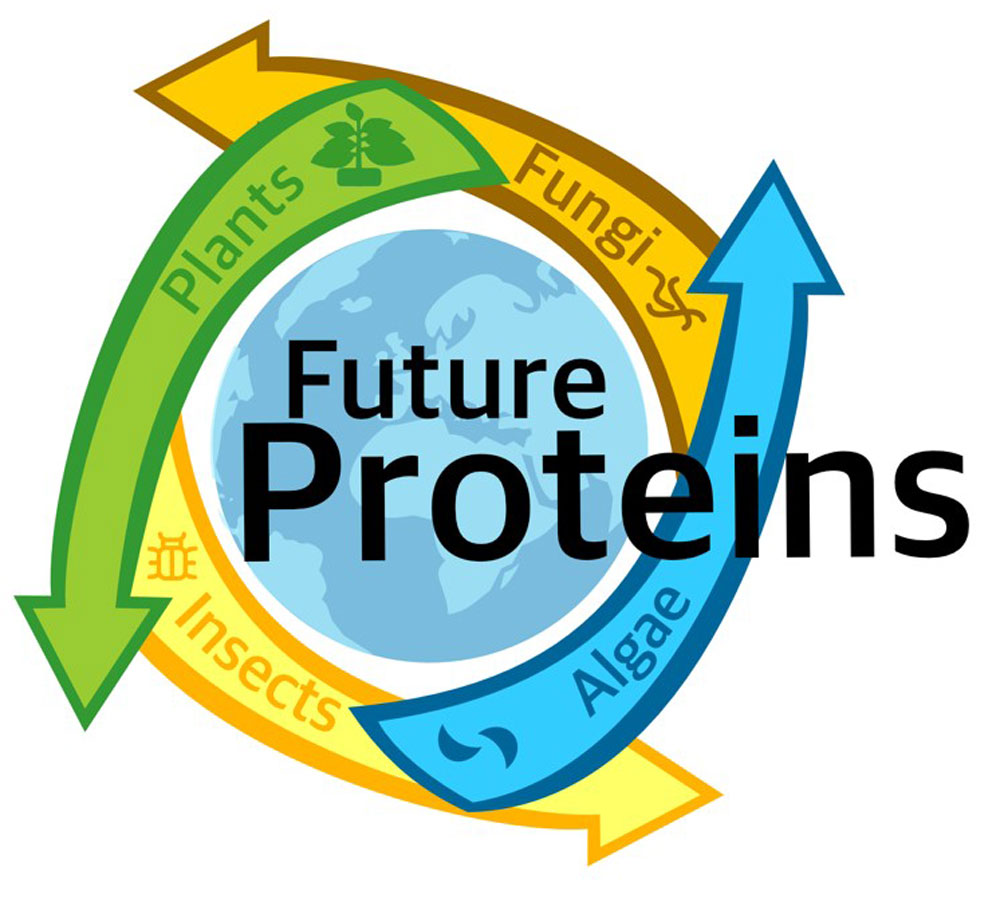FutureProteins – Coupled agricultural systems for a resilient and sustainbale production of high-quality food proteins

Proteins are vital for life. At the same time, there is a protein shortage in the global food supply. Due to extreme weather conditions as a result of climate change as well as soil and water pollution caused by the use of pesticides and fertilizers, this shortage can increase in the future. One approach to tackle this challenge is to open up novel protein sources as a sustainable alternative for animal source foods suitable for the masses. In the flagship project “FutureProteins”, six Fraunhofer institutes develop new cultivation systems, which can produce nutritious proteins from selected plants, insects, fungi and algae.
Experts have long been recommending to switch over to alternative protein sources, not only to cut down or even fully substitute the consumption of animal source foods, but also to contribute to sustainability. Opening up such alternative sources and exploiting their full potential within the food industry requires new agricultural systems for a sustainable production as well as the efficient use and exploitation of by-products and waste material.
The flagship project “FutureProteins” combines the production of alternative protein sources in closed agricultural systems with an integrated use of all by-products to create further protein raw materials. Selected plants (potatoes, wheatgrass and alfalfa), insects (mealworms), filamentous fungi as well as microalgae serve as alternative protein sources within the project. All of these sources contain high-quality amino acids that are essential for human foods as well as good processing properties, making them particularly attractive for the food industry.
A shortcoming, especially with certain plant proteins, is the ingredient-related bitter taste or interfering impacts on the aroma: potato protein, for instance, has gel-forming properties and is therefore ideally suited for the production of plant-based meat alternatives; however, potato protein also contains solanine, which gives it its bitter taste, thus rendering it unusable for the food industry. The project will work on the avoidance of these ingredients.
“FutureProteins” focuses on four closed cultivation systems: vertical farming for plants, insect farming for mealworms, bioreactors for fungi, and photobioreactors for algae. A major advantage is that the individual protein sources can be grown all year round, independent of climate, and therefore with high efficiency and resilience. Moreover, the closed cultivation systems are very resource-efficient methods compared to conventional farming processes: vertical farming requires only 5% of the usual water amount and 50% less fertilizer, while no pesticides are required.
To further optimize the future-oriented vertical farming in terms of energy and cost efficiency, the lighthouse project develops a hybrid lighting system for plants that dynamically and wavelength-specifically combines sunlight and LED light. Light also plays an important part in algae cultivation, where the light output inside the photobioreactors is optimized by means of artificial lighting, AI-based control and automation. The biggest challenge in insect farming is to prevent contaminations from insect pathogens and avoiding the use of antibiotics and pesticides. In this context, the consortium will develop a suitable monitoring system to protect insect farms from contagious diseases. With a view to the cultivation of filamentous fungi as a protein source, the principal task is to provide cost-efficient growth media for the fungi.
Another important aspect of “FutureProtiens” is the use and exploitation of by-products from energy, waste and water emerging from the four applied cultivation systems and their individual processes to generate closed, cost-efficient and resource-conserving cycles along the value chain. For example: besides the manufacturing of plant-based protein ingredients in vertical farms, all plant parts will be used as a substrate for the cultivation of insects, fungi and algae, while waste heat can be used for air-conditioning in insect farming.
At last, the sensory and functional properties of the new protein sources will be optimized and refined for a broad application spectrum in the food industry. This comprises the development of food formulations with an improved nutritional profile as well as the evaluation of consumer acceptance and sustainability factors.
The duration of the lighthouse project will span four years. Within Fraunhofer, the project is of high relevance for the strategic research fields “Bioeconomy” as well as “Resource Efficiency and Climate Technology” and for the lighthouse market “Food Economics”. The ambitious aim of “FutureProteins” is a novel and particularly sustainable approach, based on global demand, which lays the foundation for new development projects and for a future technology leadership by Fraunhofer in the agricultural and food sector.